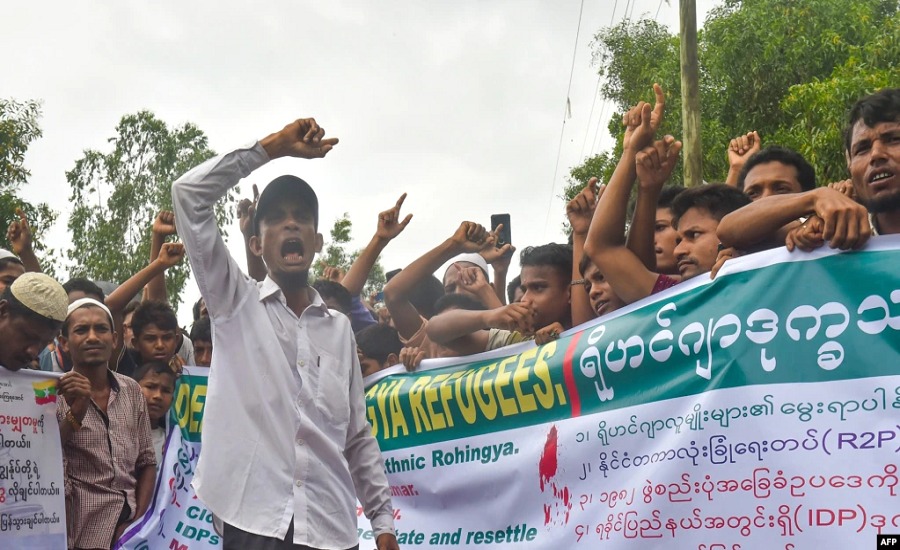
Rohingya refugees participate in a Lets go home rally demanding repatriation at the Kutupalong Rohingya camp in Coxs Bazar Bangladesh June 19 2022 - Credit Photo VoA
Authors: Riya Singh Rathore and Sabber Kyaw Min for the Rohingya Human Rights Initiative
On 19th June, Dhaka witnessed Rohingya refugees launch the new 'Go Home’ campaign. A banner stretching between the demonstrators reads, "March to our native Arakan, our motherland. We are the citizens of Myanmar. Please world community, help us to save our rights in Myanmar. Let's go home. Let's go to Myanmar." Similar protests mushroomed in over 23 areas across southeast Cox's Bazar, with Rohingyas of all different backgrounds joining
Rohingyas are a highly persecuted Muslim ethnic minority group from Myanmar's Arakan region. They are primarily persecuted by Buddhist nationalists for practising Islam as their faith. Following large-scale violence in the form of murders, rapes, arson, harassment, economic boycotting, and illegal arrests in 2017, many Rohingya fled to neighbouring countries such as Bangladesh, Malaysia, and India to seek refuge. Bangladesh accommodates the largest number of Rohingya refugees, nearly one million, of which 110,000 are children. However, in the last five years, the conditions for the community have only worsened, both in Myanmar and in their host states.
For instance, Bangladesh's Prime Minister Sheikh Hasina rhetorically questioned the length of time Bangladesh will bear the "burden" of a million displaced Rohingya. In the same meeting, she expressed sympathy for the Ukrainians displaced during the Russia-Ukraine conflict. This meeting took place on Sunday, the same day the refugees launched the 'Go Home' campaign.
It's evident then that the campaign is not only a result of years of the community's frustration with the international community's inaction but also the “hellish” living conditions in the camps. The living conditions of the refugees are inadequate at best with the small tarpaulin and bamboo tents routinely getting flooded or catching fire. The refugees simultaneously suffer the risk of disease and malnutrition, especially the youth. 52% of people in the camps are children. Aside from the dangerous living conditions, residents say that at least three armed criminal gangs are currently fighting for control of the camps in Bangladesh. Nur Sadek, a refugee who arrived in the Cox's bazaar camp at the age of 15, outlines how the armed groups kidnap people from the camps in return for ransom. “We’re just surviving with fear. We have no other option.” Nur confesses.
As a result of half a decade of neglect and surviving on the bare minimum, the Rohingyas feel disillusioned with the international diplomacy and justice system, especially with the International Criminal Court. This dissatisfaction has given way to refugees deciding to rally for justice themselves. "5 years have passed. How many days will we remain homeless?" Mohammed Musa, a Rohingya activist and humanitarian worker, asked at the 'Go Home' demonstration. He began by thanking the United Nations and other humanitarian organisations for aid with food and shelter. However, in his address to the crowd, he declared, "But Bangladesh isn't our country. We want to return to our homeland- Myanmar." He also critiqued the inaction on the 2017 civil agreement signed between Bangladesh and Myanmar, with the support of China and the United States.
The crisis has come to a head. The two options Rohingyas usually have, which are to stay in Myanmar or to flee to neighbouring countries, are both becoming unsafe. In Myanmar, the Rohingyas are increasingly getting displaced from their villages, especially after the 2021 coup. Meanwhile, in host countries such as Bangladesh and India, they are harassed, detained, or deported. The latest victim of which was Hasina Begum, who India separated from her husband and three children, jailed for a year, and then illegally deported.
Given such rising hostility in the host countries and a general lack of action against Myanmar's state-sponsored violence against the community, Rohingyas seem to be poised for a reverse exodus. Afruza, the Founder and Executive Director of Rohingya Women for Justice and Peace, tells us “I myself don't safe surviving life in the camp. We do not see any solution for us other than to return to Myanmar. So, people demand that they want to go back home with safety, security, citizenship, and full dignity.”
Afruza is alluding to the 'Go Home' campaign demands that Rohingyas tabled for the world leaders. They are as follows, a call for ethnic Rohingyas to regain citizenship, immediate repatriation of the Rohingya in their native villages and not refugee camps, abolishment of the 1982 constitution law, a ban on the torture of the general public in Myanmar, ensuring the rights and safety of the Rohingya, and unrestricted movement of INGOs and international media.
Currently, the international Rohingya community's principal focus is on their human rights being restored, followed by a safe and dignified return to their native villages, which they were forced to flee in 2017. Although many point out that the atmosphere in Myanmar is just as hostile to the Rohingya as when they escaped, if not more so, the community feels a sense of urgency to return and reclaim their land.
Following this year’s international refugee day, the "go home" campaign casts light on the cracks in the international refugee accommodation system and the lack of a long-term solution to any refugee crisis. Especially ones that take place in the global south. While immediate help in the form of humanitarian aid is critical to sustaining refugees, it's equally important for global bodies and civil society to develop a long-term solution for rehoming the displaced. A dignified return home must be the foremost priority in formulating any such solution.
Authors are activists for the Rohingya Human Rights Initiative

